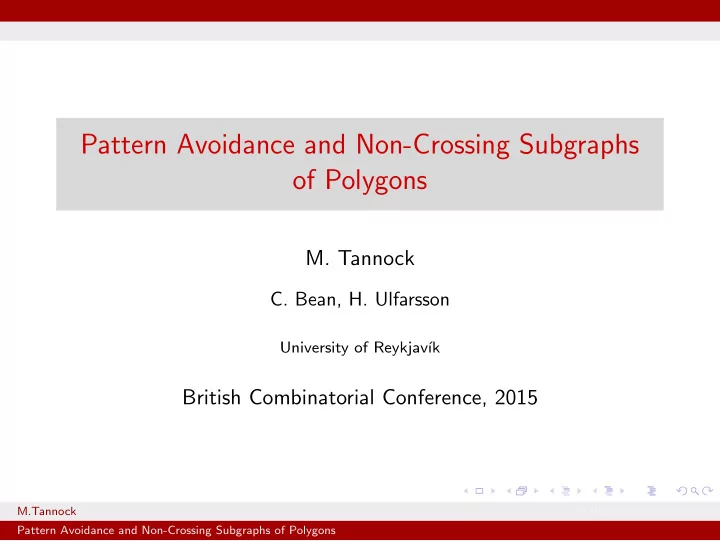

Pattern Avoidance and Non-Crossing Subgraphs of Polygons M. Tannock C. Bean, H. Ulfarsson University of Reykjav´ ık British Combinatorial Conference, 2015 M.Tannock University of Reykjav´ ık Pattern Avoidance and Non-Crossing Subgraphs of Polygons
Definition (Permutation) A permutation is considered to be an arrangement of the numbers 1 , 2 , . . . , n for some positive n . Definition (Pattern) A permutation, or pattern , π is said to be contained in, or be a subpermutation of, another permutation, σ if σ contains a subsequence order isomorphic to π . π = 314592687 M.Tannock University of Reykjav´ ık Pattern Avoidance and Non-Crossing Subgraphs of Polygons
Definition (Permutation) A permutation is considered to be an arrangement of the numbers 1 , 2 , . . . , n for some positive n . Definition (Pattern) A permutation, or pattern , π is said to be contained in, or be a subpermutation of, another permutation, σ if σ contains a subsequence order isomorphic to π . π = 314592687 σ = 1423 M.Tannock University of Reykjav´ ık Pattern Avoidance and Non-Crossing Subgraphs of Polygons
Definition (Classical Permutation Classes) A Classical permutation class , is a set of permutations closed downwards under the subpermutation relation. We define a classical permutation class by stating the minimal set of permutations that it avoids. This minimal forbidden set of patterns is known as the basis for the class. The class with basis B is denoted Av ( B ) and Av n ( B ) is used to denote the set of permutations of length n in Av ( B ). M.Tannock University of Reykjav´ ık Pattern Avoidance and Non-Crossing Subgraphs of Polygons
132-avoiding permutations Given any permutation, π , we can extract the left-to-right minima. M.Tannock University of Reykjav´ ık Pattern Avoidance and Non-Crossing Subgraphs of Polygons
For any permutation π ∈ Av n (132) M.Tannock University of Reykjav´ ık Pattern Avoidance and Non-Crossing Subgraphs of Polygons
Given this representation we can construct a graph 11 12 13 14 22 23 24 33 34 44 M.Tannock University of Reykjav´ ık Pattern Avoidance and Non-Crossing Subgraphs of Polygons
An independent set of size k and a positive integer sequence of length k uniquely determines a 132-avoider. M.Tannock University of Reykjav´ ık Pattern Avoidance and Non-Crossing Subgraphs of Polygons
There is in bijection with non-crossing subgraphs on a regular polygon and the independent sets. 44 11 12 13 14 14 22 23 24 13 ← → 34 12 33 34 33 11 24 23 44 22 M.Tannock University of Reykjav´ ık Pattern Avoidance and Non-Crossing Subgraphs of Polygons
We can also directly enumerate this. M.Tannock University of Reykjav´ ık Pattern Avoidance and Non-Crossing Subgraphs of Polygons
d F 0 x · F x · y · F 2 1 x · y 2 · F 2 ( F − 1) 2 . . . . . . x · y n · F 2 ( F − 1) n − 1 n . . . . . . Deriving the generating function. M.Tannock University of Reykjav´ ık Pattern Avoidance and Non-Crossing Subgraphs of Polygons
This leads to the following generating function: xy · F ( x , y ) 2 F ( x , y ) = 1 + x · F ( x , y ) + 1 − y · ( F ( x , y ) − 1) . � � Evaluating F x gives the Catalan numbers. x , 1 − x M.Tannock University of Reykjav´ ık Pattern Avoidance and Non-Crossing Subgraphs of Polygons
1324-avoiders Given π ∈ Av n (1324) we can extract the boundary. M.Tannock University of Reykjav´ ık Pattern Avoidance and Non-Crossing Subgraphs of Polygons
Non-intersecting boundary of a 1324-avoider. M.Tannock University of Reykjav´ ık Pattern Avoidance and Non-Crossing Subgraphs of Polygons
For 1324-avoiders with non-intersecting boundary and two right to left maxima. Let: x 2 · F G = 1 − y · ( F − 1) Then: G + 1 H = 1 − y · G − 1 M.Tannock University of Reykjav´ ık Pattern Avoidance and Non-Crossing Subgraphs of Polygons
This corresponds to non-crossing subgraphs on a polygon with multiple edges as shown below. M.Tannock University of Reykjav´ ık Pattern Avoidance and Non-Crossing Subgraphs of Polygons
Recommend
More recommend